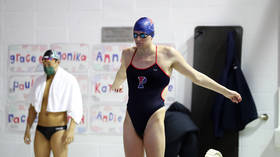Trans athlete who is becoming a woman gives verdict on sporting fears

Transgender US college swimmer Iszac Henig, who is transitioning from female to male, has called his decision to change gender "life-saving" and said that trans athletes are "no different" to other competitors.
A fierce row over fairness in sport has intensified since transitioned University of Pennsylvania swimmer Lia Thomas smashed records in female competition earlier this year.
Teammates of Thomas said that they supported her transition but did not believe she should be allowed to compete against them, according to a letter obtained by the Washington Post earlier this week.
US Swimming also recently announced an immediate change in policy requiring female athletes to have a testosterone concentration level under 5 nmol/L for a continuous period of at least 36 months – slashing the level previously allowed.
Yale star Henig revealed he personally made contact with Thomas months before beating her in two races.
Reports subsequently claimed those results led to accusations that Thomas had held back her effort, finishing sixth in her 100-meter defeat to Henig.
“We met for the first time at the Yale-Penn-Dartmouth meet in January, which was also just a quick hello," Henig said of her support for Thomas, speaking to AP.
"She’s an incredible athlete, I have a ton of respect for her. I think we’re lucky to have her in the league.”
Henig, who remains on the women's team and has not started hormone treatment to become a man yet, is set to face Thomas again in the pool in the Ivy League championships next week.
The 20-year-old denied accusations of collusion with Thomas and voiced their concerns about a new policy by the under-pressure National Collegiate Athletic Association (NCAA) over the issue.
The association has allowed each sport to set its own rules under the new policy, but Henig believes not enough inclusivity safeguards are in place.
“Trans-inclusive sports policies already exist and already work,” Henig said. “At every level, from elementary to collegiate, trans athletes have been competing for years – and the extremely negative predictions about what will happen to sports have already been shown to be false.
"In every sport, at every level, there is a wide range of athletic abilities on display. Trans athletes are no different and don’t change this.”
A succession of bills in US states have attempted to outlaw transgender athletes from competing against rivals born as women.
Supporters of the legislation argue that athletes born as men – particularly those who go through puberty before transitioning – have an unfair advantage and are preventing female-born prospects from fully realizing their potential.
"I was initially concerned about swimming and how my team would react but they’ve shown me nothing but support and love," Henig said of his announcement to his teammates about his transition, which he made while the sport was on hold because of the pandemic.
“For me, transitioning was less of a decision and more like a necessary, life-saving shift towards increasing authenticity in the way I live my life,” he said.
“If there’s even just one young person out there that is looking for encouragement to be their best self and seeing my story helps push them in that direction, that would be enough for me."















